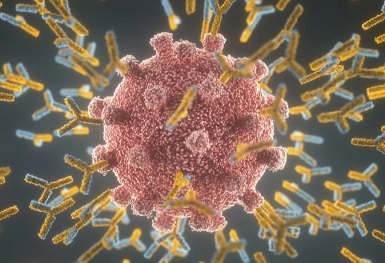Cambridge Study Finds That SARS-CoV-2 Omicron Infection Induces Immune Imprinting Even Prior To Vaccination
Nikhil Prasad Fact checked by:Thailand Medical News Team Apr 15, 2024 1 year, 1 week, 3 days, 16 hours, 6 minutes ago
COVID-19 News: The ongoing battle against the SARS-CoV-2 virus has been marked by a relentless struggle to keep pace with its evolution. Despite significant progress in vaccination efforts and global exposure leading to population-level immunity, new variants like Omicron continue to pose challenges to public health strategies. This
COVID-19 News report delves into the intricate dynamics of immune responses, focusing on the phenomenon of immune imprinting and its implications, particularly in the context of the Omicron variant based on a study conducted by researchers from University of Cambridge-UK, IHVN-UK, Cambridge Addenbrookes hospital-UK and Cambridge University Hospitals NHS Foundation Trust-UK.
 SARS-CoV-2 Omicron Infection Induces Immune Imprinting Even Prior To Vaccination
SARS-CoV-2 Omicron Infection Induces Immune Imprinting Even Prior To Vaccination
Understanding Immune Imprinting: Origins and Significance
Immune imprinting, also referred to as original antigenic sin (OAS), is a concept rooted in immunology that describes how the immune system's initial exposure to a pathogen influences subsequent responses to related strains. This phenomenon has far-reaching implications, as it can either enhance or hinder the body's ability to defend against evolving pathogens. Historical examples, such as the differential responses to the 2009 H1N1 influenza pandemic based on prior exposure, underscore the relevance of immune imprinting in infectious disease outcomes.
Examining Immune Responses to Omicron: Insights from a Nigerian Study
A comprehensive longitudinal study conducted in Nigeria provided a unique opportunity to dissect immune responses to SARS-CoV-2, particularly in the wake of the emergence of the Omicron variant. The study cohort, comprising individuals with diverse exposure histories, allowed for a nuanced exploration of immune imprinting effects and vaccine-induced immunity.
Findings from the Study: Imprinting Effects on Neutralization
Upon enrollment in January 2023, it was noted that 93% of participants had previous exposure to the ancestral Wu-1 virus, while 58% had been exposed to the Omicron virus, as indicated by the presence of anti-N IgG and anti-receptor binding domain (RBD) IgG antibodies specific to Wu-1 and Omicron. Interestingly, individuals without prior Omicron exposure exhibited significantly higher neutralization against Wu-1 compared to Omicron variants, aligning with expectations. However, participants who tested positive for anti-RBD Omicron IgG surprisingly showed a 2-fold decrease in serum neutralization titers against Omicron BA.1 compared to Wu-1. These findings strongly suggest the presence of imprinted immunity from ancestral pre-Omicron lineage viruses, with the older Wu-1 responses effectively dominating over more recent Omicron lineage infections, which may have been multiple in nature.
Moreover, among participants with previous Omicron exposure and evidence of imprinting, subsequent Omicron infections and Wu-1-based vaccination were linked to enhanced responses across variants, leading to the equalization of neutralization tite
rs for both Wu-1 and Omicron variants. Despite this, the Omicron responses did not surpass ancestral responses, indicating the persistence of imprinting effects and only partial mitigation even with additional exposures and vaccinations.
While post-dose 1 vaccination elicited high-titer neutralization responses against ancestral and Omicron variants BA.1, BA.2, and BA.4 in nearly all participants, neutralization against the highly immune-evasive XBB recombinant variant remained notably lower. A second vaccine dose provided only a modest boost in neutralization against the XBB variant, highlighting the challenges posed by highly divergent variants in terms of immune response elicitation.
The study's findings revealed intriguing patterns in immune responses. Participants who had prior exposure to the ancestral Wu-1 virus demonstrated heightened neutralization against it compared to Omicron variants, highlighting the imprinting effects of previous infections. Even among individuals with recent Omicron exposure, neutralization titers against Omicron were notably lower than those against Wu-1, indicating the persistence of imprinting influences on immune responses.
Impact of Vaccination on Imprinting: Unraveling Vaccine-Induced Responses
The study also delved into the impact of vaccination on immune imprinting. While vaccines elicited robust immune responses, including effective neutralization against Omicron, there were nuances in the breadth and potency of neutralizing antibodies. Notably, subsequent vaccine doses provided limited additional boosting, suggesting that initial vaccination primed substantial immune memory but had limited capacity to overcome imprinting effects entirely.
Implications for Pandemic Response and Vaccination Strategies
The study's findings hold significant implications for pandemic response strategies and vaccination approaches. Understanding the nuances of immune imprinting is crucial for optimizing vaccine efficacy and tailoring vaccination strategies to address evolving viral variants. For unvaccinated or vulnerable populations, the use of Omicron-specific vaccines may offer a more comprehensive shield against the virus by bypassing imprinting effects from ancestral strains.
Discussion: Addressing Challenges and Future Considerations
The intricate interplay between prior exposure, vaccination, and immune responses to SARS-CoV-2 variants underscores the complexity of pandemic management. Adaptive vaccination strategies, ongoing surveillance, and continuous research are essential pillars in navigating the ever-changing landscape of viral evolution and immune dynamics. Furthermore, considerations for future zoonotic virus infections must take into account the potential impacts of immune imprinting on disease severity and outcomes.
Conclusion: Navigating Immune Imprinting in the Era of SARS-CoV-2 Variants
In conclusion, immune imprinting plays a pivotal role in shaping immune responses to SARS-CoV-2 variants, including the highly divergent Omicron strain. While vaccination remains a cornerstone of pandemic control efforts, strategies must evolve to address imprinting effects and ensure comprehensive population protection. Continued research, vigilance, and adaptability are paramount in confronting the challenges posed by emerging viral variants and safeguarding public health on a global scale.
The study findings were published on a preprint server and are currently being peer reviewed.
https://www.researchsquare.com/article/rs-4186317/v1
For the latest
COVID-19 News, keep on logging to Thailand Medical News.
Read Also:
https://www.thailandmedical.news/news/covid-19-news-hybrid-immunity-and-bivalent-boosters-have-little-effect-on-new-omicron-sub-lineages-bq-1-1-and-ba-2-75-2-due-to-immune-imprinting
https://www.thailandmedical.news/news/breaking-covid-19-news-university-of-washington-study-warns-that-new-monovalent-xbb-1-5-covid-19-vaccine-causes-persistent-immune-imprinting
https://www.thailandmedical.news/news/mit-study-shows-that-long-covid-neurological-issues-is-due-to-delayed-clearance-of-sar-cov-2-caused-by-immune-imprinting
https://www.thailandmedical.news/news/breaking-mit-study-finds-that-neurocovid-manifestations-in-post-infections-are-determined-by-immunologic-imprinting-from-previous-coronaviruses
https://www.thailandmedical.news/news/breaking-emerging-sars-cov-2-variants-are-learning-to-suppress-immune-responses-against-itself-and-original-strains-helps-via-negative-immune-imprinti
